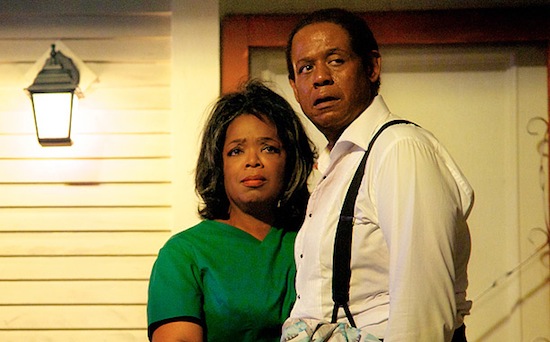We run our website the way we wished the whole internet worked: we provide high quality original content with no ads. We are funded solely by your direct support. Please consider supporting this project.
Review: “The Butler”
 For all the same reasons that some couldn’t set their politics aside to celebrate what the election of Obama meant for African Americans, I’m quite sure that some won’t be able to set their politics aside to appreciate the brilliance and power of “The Butler.” These folks will also likely allege that I’m being inconsistent with my conviction about the separateness of the two kingdoms by celebrating this film – just as they accused me of being inconsistent when I celebrated what the election of Obama meant for African Americans. I feel sorry for such people, because if you’re able to experience “The Butler” on its own terms rather than through the grid of your politics, you’ll likely find, as I did, that it is a brilliant, emotionally gripping, and profoundly insightful work.
For all the same reasons that some couldn’t set their politics aside to celebrate what the election of Obama meant for African Americans, I’m quite sure that some won’t be able to set their politics aside to appreciate the brilliance and power of “The Butler.” These folks will also likely allege that I’m being inconsistent with my conviction about the separateness of the two kingdoms by celebrating this film – just as they accused me of being inconsistent when I celebrated what the election of Obama meant for African Americans. I feel sorry for such people, because if you’re able to experience “The Butler” on its own terms rather than through the grid of your politics, you’ll likely find, as I did, that it is a brilliant, emotionally gripping, and profoundly insightful work.
“The Butler” is based (loosely) on the life of Cecil Gains, played by Forest Whitaker, who served as a butler in the Whitehouse for eight different Presidents (from Truman up through Reagan’s second term). As a young boy who witnessed his father being murdered for attempting to stand up to a white boss, Gaines learned early on that, if a black man is going to survive in America, he has two wear “two faces”: a subservient face he shows to white people in authority, and his real face he shows only to other black folk. As a butler in the Whitehouse, serving eight white presidents throughout the duration of the fight for civil rights, Gaines epitomizes the subservient face. The movie gives Cecil and his wife (played by Oprah Winfrey) a fictitious son whose activism in the civil rights movement threatens not only his own life, but Cecil’s job as a Whitehouse butler as well. In this way, Gaines becomes a poignant parable of the complex and tormenting inner conflicts that are created in the soul of African Americans when they are forced to wear a dehumanizing, subservient face to survive in a white-dominated and unjust society.
Whitaker’s performance is Oscar worthy. The manner in which Whitaker is able to convey pain and confusion through his eyes, without saying a word, is masterful! There is one powerful scene in which Cecil finally musters up the courage to point out to his white boss that African Americans in the Whitehouse are paid 40% less than whites who do the same work. Feeling that this is unfair, Cecil timidly asks his boss if the pay could be made more equitable. The white boss doesn’t even bother to look up from his paper work as he callously comments that, if Cecil is unhappy with his pay he should find work elsewhere. For the next minute we watch Cecil silently gaze at his boss who continues to engage in his paper work, oblivious to Cecil’s existence. Throughout this poignant minute, Whittaker’s tormented eyes convey the pain and confusion of a young boy seeing his father murdered for daring to confront a white man.
I’m not saying “The Butler” doesn’t have certain shortcomings. For example, while some of the Presidents are impersonated well, others are not. Alan Rickman’s rendition of Reagan came close to being a caricature, and I found the artificial nose on John Cusack in an attempt to make him look like Nixon to be an almost comical distraction. It also seemed at times like the movie was trying to cover too much and to cram in too many stars. (This clearly was a movie a lot of Hollywood folks wanted to appear in!) Some of these performances were absolutely incredible. For example, Oprah brilliantly captured the complex dynamics at work in the heart of Cecil’s wife, Jane Fonda did a stunning short performance as Nancy Reagan, and Cuba Gooding Jr. was outstanding (as he always is) as a relative of the family. But I wish the movie had less cluttered so that the focus could have been more exclusively on Whitaker and Oprah, who form the heart of this moving story.
But the truth is that this movie is so profoundly compelling and insightful on so many levels that the shortcomings strike me as negligible. The movie took me to so many places I felt a bit like I was on an emotional rollercoaster. In several scenes I found myself thinking of my three African American grandchildren and I almost exploded in tears. Other scenes, such as one in which students defying Jim Crow laws in the South are viciously abused by a crowd of angry whites, filled me with rage and sadness. And still other scenes, especially those involving Cecil and his wife in their later years, were simply poignantly tender. I can convey how deeply this movie touched me by admitting to you that, for the rest of the night following the movie, I found it impossible to talk about it with Shelley without my voice cracking.
Yet, as gut-wrenching as it is, the central message of “The Butler” is one of hope. As an elderly Cecil is ushered in to meet the first black President in American history – something he said “he’d never dreamed he live to see” – we’re reminded that, as far as we have yet to go, we’ve come a long, long way. (And no, Obama was not among the many stars that were cast in his movie.)
Bless you, and enjoy this movie!
Greg
Category: General
Tags: Movie Review, Racism, The Butler
Related Reading

Racism: Why Whites have Trouble “Getting It”
I’m a member of a special task group on racial reconciliation that consists of a dozen or so pastors from around the Twin Cities. We’ve been meeting periodically for the past year or so in order to strategize how to help the Church of the Twin Cities as a whole move forward in racial reconciliation.…

Ferguson, Racism, & the Kingdom
In light of the issues that have arisen in Ferguson, Mo this last week (for more on this click here), we thought we would offer some reflections on this topic from Greg that he wrote several years ago. A version of this piece eventually ended up in Greg’s book Myth of a Christian Religion. ___________________________________ Many…

The Church & Racism in America
Elias Schewel via Compfight Over the weekend, tapes were released that revealed some shocking racists statements attributed to the owner of the Los Angeles Clippers. President Obama has commented. Sports analysts have opined. Coaches and players in the NBA are understandably disgusted and overwhelmed by it all. What should the church say at a time like this?…

Confessions of a Christian Nation (Racism)
In honor of Dr. Martin Luther King Jr., Greg Boyd, Brian McLaren and Brian Zahnd apologize to the African American community for the church’s complicity in the oppression of African Americans throughout American history. Video by Rex Harsin

Is Racism Still a Problem? Does the Church Care?
Cliff via Compfight On Friday, we posted a piece by Greg on the importance of racial reconciliation in the Kingdom of God. (Click here to read it.) This is a part of the Synchro blog for MennoNerds on Race. Watch this video for more on the topic. The following is an illustration taken from an…

Podcast: Some Thoughts on Charlottesville
Greg discusses Charlottesville. http://traffic.libsyn.com/askgregboyd/Episode_0196.mp3
